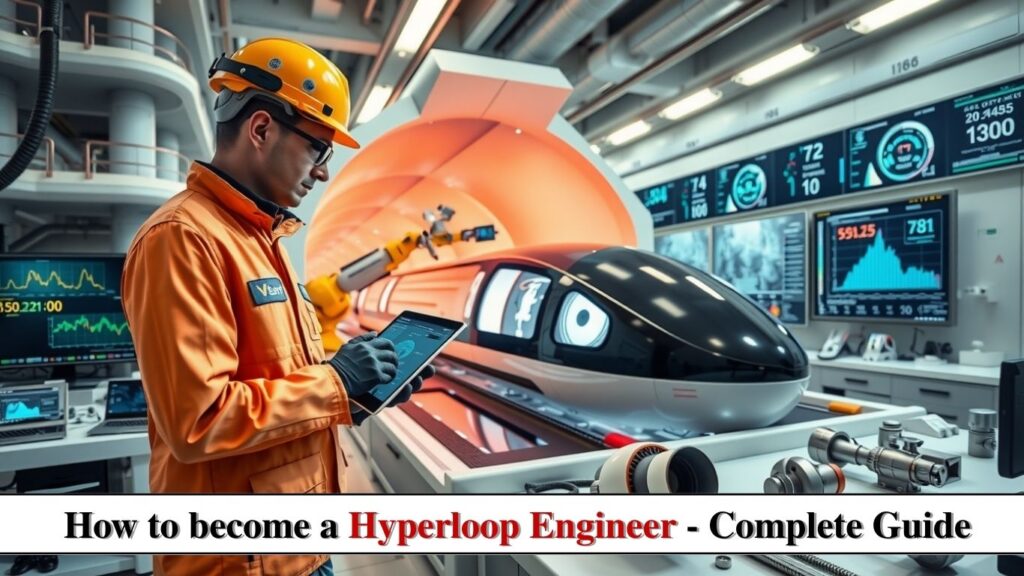
Introduction to Hyperloop Engineering
The Hyperloop represents one of the most revolutionary transportation concepts of the 21st century – a near-supersonic, tube-based system that could transform how we travel. As this technology moves from concept to reality, Hyperloop Engineers are becoming the pioneers of next-gen mobility.
This comprehensive guide covers everything you need to know about this cutting-edge career:
- The History and Evolution of Hyperloop Technology
- Key Engineering Roles and Specializations
- 2024 Global Salary Expectations
- Essential Education and Skills
- Step-by-Step Career Pathway
- Future Prospects and Industry Challenges
History of Hyperloop Technology
The Hyperloop concept has roots in centuries of transportation innovation:
Key Historical Milestones:
- 1799: George Medhurst proposes pneumatic tube transport
- 1904: Robert Goddard envisions vactrain concept
- 2013: Elon Musk publishes Hyperloop Alpha whitepaper
- 2015: First student competitions begin
- 2017: Virgin Hyperloop completes first full-scale test
- 2020: First human passenger test
- 2023: Multiple commercial projects in development
Today, companies like Virgin Hyperloop, Hardt Hyperloop, and Hyperloop TT are racing to bring this technology to market.
Hyperloop Engineer Roles and Responsibilities
Hyperloop engineering requires multidisciplinary expertise across several specialized domains:
Core Engineering Disciplines:
- Pod Systems Engineers
- Design levitation and propulsion systems
- Develop aerodynamic pod structures
- Optimize passenger/cargo configurations
- Tube Infrastructure Engineers
- Design low-pressure tube networks
- Calculate structural and thermal loads
- Develop maintenance access systems
- Vacuum Systems Engineers
- Maintain near-vacuum conditions
- Design airlock and pumping systems
- Solve pressure differential challenges
- Magnetic Levitation Engineers
- Develop passive/active maglev systems
- Optimize energy-efficient levitation
- Implement guidance and stability controls
- Safety and Operations Engineers
- Create emergency protocols
- Design evacuation systems
- Develop AI monitoring solutions
Key Responsibilities:
✔ Conduct CFD and structural simulations
✔ Perform system integration testing
✔ Solve thermal expansion challenges
✔ Develop scalable infrastructure solutions
✔ Ensure regulatory compliance
Hyperloop Engineer Salary (2024)
As an emerging field, salaries reflect the specialized nature of this work:
| Country | Entry-Level | Mid-Career | Senior-Level |
|---|---|---|---|
| USA | $85,000 | $120,000 | $160,000+ |
| UK | £50,000 | £75,000 | £100,000+ |
| UAE | AED 200,000 | AED 350,000 | AED 500,000+ |
| India | ₹10 LPA | ₹20 LPA | ₹35 LPA+ |
Top Employers:
- Virgin Hyperloop
- Hardt Hyperloop
- Hyperloop Transportation Technologies
- Major Infrastructure Firms
- Government Research Agencies
Qualifications and Skills Required
Educational Pathways:
- Bachelor’s in:
- Aerospace Engineering
- Mechanical Engineering
- Electrical Engineering
- Mechatronics
- Advanced Degrees Preferred:
- MSc in High-Speed Transportation
- PhD in Maglev/Vacuum Systems
Essential Technical Skills:
✔ CAD (CATIA, SolidWorks)
✔ CFD Analysis (ANSYS, OpenFOAM)
✔ Magnetic Levitation Principles
✔ Vacuum System Design
✔ High-Speed Aerodynamics
Certifications:
- Professional Engineer (PE) License
- Hyperloop-Specific Training Programs
- Project Management (PMP)
- Systems Engineering Certifications
How to Become a Hyperloop Engineer
Step 1: Build Strong STEM Foundation
- Focus on physics and advanced mathematics
- Participate in engineering competitions
Step 2: Pursue Relevant Education
- Select engineering discipline with hyperloop applications
- Take specialized courses in high-speed transport
Step 3: Gain Practical Experience
- Intern with hyperloop companies
- Contribute to open-source hyperloop projects
- Join university hyperloop teams
Step 4: Develop Specialized Expertise
- Master simulation software
- Study maglev and vacuum systems
- Understand high-speed infrastructure
Step 5: Build Professional Network
- Attend hyperloop conferences
- Join professional organizations
- Connect with industry pioneers
Future Scope and Challenges
The hyperloop market is projected to reach $6 billion by 2026 (Global Market Insights).
Emerging Trends:
🚄 First Commercial Deployments (2025-2030)
🌍 International Route Development
⚡ Energy Storage Innovations
🤖 AI-Powered Operations
🛠️ Modular Construction Techniques
Key Challenges:
- Regulatory approvals
- Massive infrastructure costs
- Public acceptance
- Safety certification
Conclusion
Hyperloop engineering represents the pinnacle of transportation innovation, offering professionals the chance to literally shape the future. While challenges remain, the potential rewards – both professional and societal – are enormous.
Key Takeaways:
✅ Develop strong multidisciplinary engineering skills
✅ Gain hands-on experience through competitions and internships
✅ Specialize in critical subsystems like maglev or vacuum
✅ Stay adaptable in this rapidly evolving field
The race to build functional hyperloop systems is on – will you help lead the charge?
This in-depth guide provides everything you need to launch your career in this revolutionary field! 🚀













Post Comment